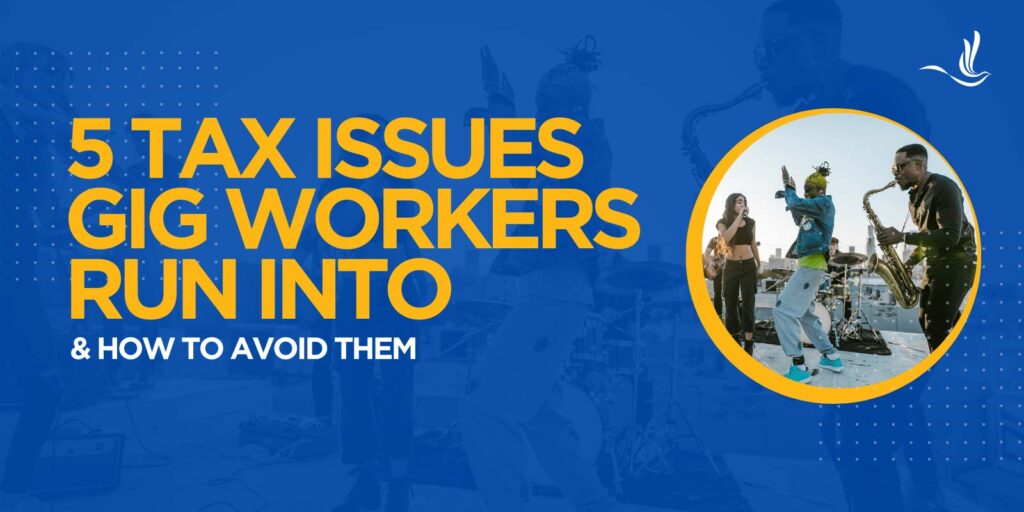
In the dynamic landscape of the gig economy, where flexibility and independence are highly valued, many workers find themselves navigating the complex terrain of self-employment taxes. While the gig economy offers opportunities for individuals to earn income on their own terms, it also comes with a set of responsibilities, particularly when it comes to filing taxes. Here are the top five tax issues gig workers run into with their taxes and how to avoid them.
Failure to Set Aside Money for Taxes
One common pitfall for gig workers is not setting aside a portion of their earnings for taxes throughout the year. Unlike traditional employees who have taxes automatically withheld from their paychecks, gig workers are responsible for managing their own tax obligations. Failing to set aside money regularly can lead to a significant financial burden come tax season.
To avoid this mistake, gig workers should establish a dedicated savings account and consistently allocate a percentage of their income for taxes. A solid rule of thumb is to set aside 30% of your business income for taxes. Be sure you know every tax you are responsible for. For example, gig workers will need to pay self-employment taxes while regular W-2 workers do not.
Underreporting Income
Some gig workers inadvertently underreport their income, either due to a lack of understanding or an attempt to reduce their tax liability. This mistake can have serious consequences, including penalties and interest on unpaid taxes. Remember, now more than ever is a bad time to owe the IRS. Inflation has caused higher than normal IRS penalties and interest rates.
To avoid this error, gig workers should maintain accurate records of all their income, including earnings from various platforms and any cash transactions. You should receive IRS Form 1099-K from these platforms. Utilizing accounting software or hiring a professional can help ensure that all income is properly accounted for.
Overlooking Deductions and Credits
Gig workers often miss out on valuable deductions and credits that can help reduce their tax liability. Common deductible expenses for gig workers may include mileage, home office expenses, and equipment costs. Additionally, they may be eligible for the Qualified Business Income (QBI) deduction and other tax credits. Failing to take advantage of these opportunities means potentially paying more in taxes than necessary.
Gig workers should stay informed about tax laws and work with a tax professional to identify and claim all eligible deductions and credits. For example, as previously mentioned, gig workers must pay self-employment taxes. However, they may deduct half of the 15.3 percent self-employment tax during tax time. Do your research on what you can deduct but be careful not to deduct things you are not eligible for.
Neglecting Estimated Tax Payments
Unlike traditional employees, gig workers typically don’t have taxes withheld from their earnings throughout the year. Instead, they are responsible for making quarterly estimated tax payments. Neglecting these payments can result in underpayment penalties. Currently, underpayment penalties are 0.5% of the tax owed and it is due each month that the tax goes unpaid, for a maximum of 25% of the total balance.
To avoid this mistake, gig workers should calculate their estimated tax liability and make timely payments to the IRS. Keeping track of income and expenses throughout the year can help with accurate estimations. The IRS offers a helpful online estimated tax payment calculator to make this step easy for gig workers.
Misclassification of Employment Status
Gig workers must correctly classify their employment status, whether they are considered independent contractors or employees. Misclassification can lead to tax issues and potential legal consequences. Some platforms may incorrectly categorize workers, so it’s crucial for gig workers to understand the criteria used by the IRS to determine their status. If uncertain, seeking professional advice or consulting IRS guidelines can help ensure proper classification and compliance with tax regulations.
Tax Help for Gig Workers
Navigating the tax responsibilities of gig work requires diligence and proactive financial management. By avoiding these common tax issues, gig workers can ensure a smoother tax-filing process and potentially reduce their overall tax liability. Seeking professional guidance and staying informed about tax laws are crucial steps toward financial success in the gig economy. Optima Tax Relief is the nation’s leading tax resolution firm with over a decade of experience helping taxpayers with tough tax situations.
If You Need Tax Help, Contact Us Today for a Free Consultation